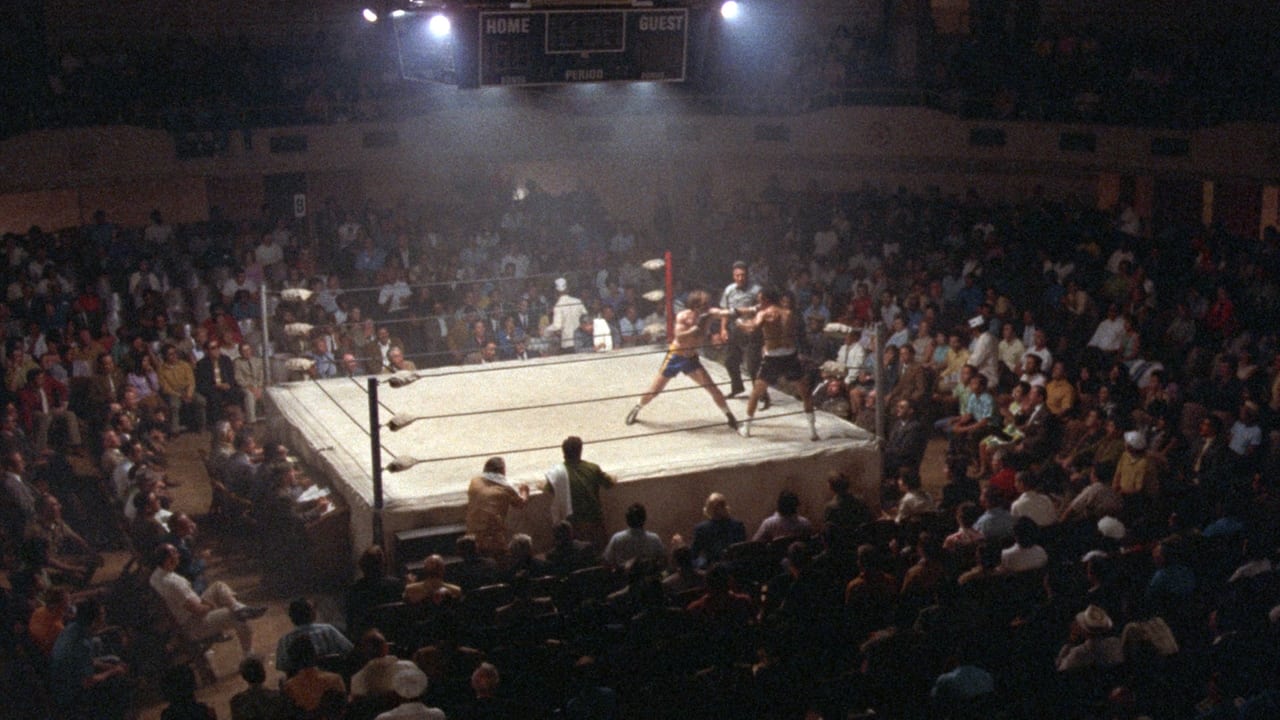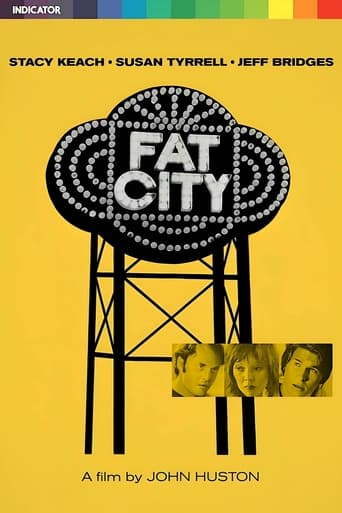lasttimeisaw
Glancing with a documentary eye, John Huston's FAT CITY opens with Kris Kristofferson's lugubrious HELP ME MAKE IT THROUGH THE NIGHT to accommodate to a downbeat tonality, and concomitantly fills the screen with montages of the story's locale and denizens, a rundown California town called Stockton in the 50s, and then introduces Billy Tully (a cleft-lipped and hair- receding Keach), a divorced, childless peckerwood and former boxer on the brink of turning 30, doing odd jobs from hand to mouth, he aspires to return to the ring, but both physically and mentally he hasn't been conditioned to reclaim his glory. Meantime, a young stud Ernie Munger (Bridges), recommended by Billy, starts his professional boxing days but is he really the "one in a million" material which Billy sees in him? The script is penned by the author of its source novel, Leonard Gardner, which warrants fidelity to a large extent but also leans more on Billy than Ernie in the narrative. The boxing scenes, to the lights of a pugilism outsider, are less vicarious and impactful than its more famed cinematic cousins and sometimes one can discern they are playacting, both Keach and Bridges are not toned up in a pro's shape, but that might be the case here, Billy is over the hill, and the allusive reason behind his hard-earned victory is more due to his opponent's deteriorating health than his own prowess. As for Ernie, he loses both two matches presented on-screen and has a soft belly which both literally and metaphorically implies that he is a younger version of Billy, getting married out of onus rather than love, the road ahead of him looks glum, and it speaks volumes in the final close- up where the two boxers sitting sipping their coffee in concert but inside they are miles away from each other (Billy is a lush Ernie tries to avoid), without obvious effort of fumbling for words, that silent moment could be the only time they share before parting company for keeps, no matter how similar their trajectories will be, both Keach and Bridges (at a tender age of 23) are extraordinary players of conveying connotations and embodying nuances. A boisterous Susan Tyrell snatches an Oscar nomination for her terrific turn as Oma, a barfly who strikes a romantic relationship with Billy, but she is a damaged goods through and through, married twice before, habitually drenched in the hard stuff, Billy might be merely a fling to her while her current lover is in the jug. The two-handers between them are coruscating with sheer communion (in the seedy bar where they engages themselves from small talk to wearing their affectionate hearts on their sleeves), or blistering intensity (in their equally mangy bedsit where Huston pulls off the most kitchen-sink spat in the American map), she is an attainable lure for a rough diamond like Billy, but she will do him no good, and the vicious circle will never cease to repeat, time and again, because loneliness brings people together but it takes a helluva luck to be able to stick together.In a word, FAT CITY is on the top rung of Huston's corpus, a strangely disconsolate but whole- heartedly candid social critique of the stagnation and cul-de-sac facing by the have-nots, bestowed with a sublimely subdued texture with unobtrusive dexterity, but as a boxing drama, it still looks rough-hewn and conspicuously pulls its punches in terms of veracity.
Martin Bradley
One of John Huston's late masterpieces. In fact, if "Fat City" were the only John Huston film you were ever to see you would still know you were watching the work of a great director. Leonard Gardner adapted his own novel about a punch-drunk boxer hoping to make a comeback and Huston transformed it into a sad, funny elegy on the themes of loss and survival; every scene makes a point, every scene hits home.It's also magnificently acted. Stacy Keach is Tully, the boxer who's a born loser. Jeff Bridges is the younger boxer who's 'soft in the middle' and who's no more likely to make it than Tully. Nicholas Colasanto steals almost every scene he's in as their manager, sadly another loser and there's a phenomenal performance from Susan Tyrrell as the lush Keach takes up with. She was Oscar-nominated and she should have won. This is also one of the greatest boxing pictures ever made.
SnoopyStyle
Ernie (Jeff Bridges) is a loser fighter who can't last more than the time it takes to hang up his robe. Tully (Stacy Keach) is an old drunk and a fighter past his usefulness. Tully laments the old times and is trying to get back into the fight game. He shacks up with another drunk Oma (Susan Tyrrell).Director John Huston brings us a portrait of the ugly side of boxing. These are the nobodys. Susan Tyrrell's performance is truly shocking. Her character is worth the watch for this movie. Although the story follows both Ernie and Tully, it's probably a better idea to concentrate more on Tully. Ernie's story can be told as a side issue to Tully. Stacy Keach has the more compelling character. His struggle is more poignant. He should have been the only protagonist.
bkoganbing
Fat City has deservedly taken its place among the fine films about boxing that Hollywood has done. It most closely resembles Requiem For A Heavyweight and you get double the entertainment because it's about two boxers in that division whose prospects for success are limited.Stacy Keach and Jeff Bridges meet at a YMCA gym. Keach a heavyweight who has seen better days was a good prospect to go all the way, but he married the wrong woman who drained him dry and left him. But Keach is a glutton for punishment and he's taken up with Susan Tyrell who is mesmerizing when she's on the screen. Not that the prospects are good for him to hold out for something better, he's no prize either.But Keach sends Bridges to his former manager Nicholas Colosanto and he also joins them. Bridges has never had a professional fight, but he's clean cut, all American and white. He might be a good draw if he can learn to fight. His debut isn't promising. And he and wife Candy Clark face the problems of all newlyweds.The air of sadness that hangs around Fat City is that the audience knows full well these guys aren't going anywhere. Keach gets matched with a similar over the hill heavyweight played nicely by Sergio Rodriguez. He barely outlasts him and while the little entourage is celebrating this beginning of a comeback, we see Sergio leave the arena alone as the lights turn out after him. Very effectively staged by John Huston.The highlight of Fat City is Susan Tyrell who as TCM was showing this film as its prime time feature was reported to have passed away. What an incredible performance as a down and out alcoholic. She received the only Oscar recognition for Fat City as she was nominated for a Best Supporting Actress Oscar. Boxing fans will appreciate the realistic approach Fat City takes in regard to the sport. Others of us will just like the great performances and realistic filming that typifies Fat City.

